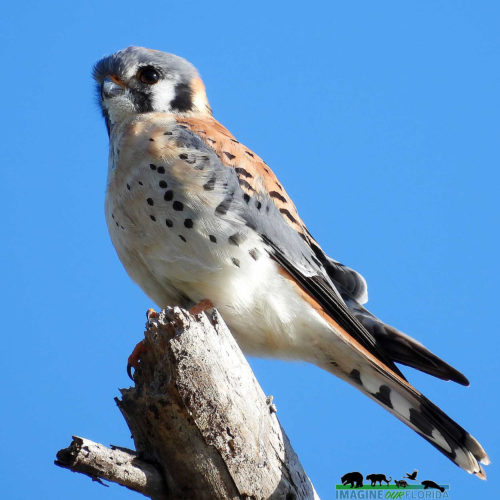The American Kestrel, Falco sparverius, is our nation’s smallest falcon with a wingspan of no more than 24 inches. It is a common sight throughout the US including in Florida from the panhandle to the central part of the state. Kestrels are common winter visitors in southern Florida.
Look for American Kestrels in areas that are open with a few trees and low-growing vegetation. Kestrels adapt to human-created pastures and parks. Longleaf pine forests are perfect habitats for breeding.
An American Kestrel’s diet is made up of mostly insects such as grasshoppers, dragonflies, butterflies, and beetles. They will also eat small birds and rodents including lizards, frogs, mice, bats, and songbirds. Most often the Kestrel will swoop down from a perch to catch prey. When in open areas, the kestrel will fly over the area and catch the prey in flight. Kestrels generally hunt during the day.
Males search for places suitable for a nest. He will show the female a variety of options including cavities in a tree such as an old woodpecker hole, crevices in buildings, or human-provided nesting boxes. The female will choose the nest and lay 4-5 eggs. Both parents incubate the eggs for up to a month. The male provides most of the food until the young fledge when they are about 1 month old.
Although American Kestrels are currently abundant, there is still cause for concern. Clearing of land for development, cutting down the dead trees they rely on for nesting sites, and pesticides that destroy their food sources have caused their populations to decline by 1.39% each year between 1966 and 2017. (North American Breeding Bird Survey.) This puts them on track for a population decline of 50% by 2075.
Consider putting up a nest box for a pair of American Kestrels. Learn who is running for office in your city, county, and state. Ask what their platform is on environmental justice. Advocate for Florida’s wildlife including American Kestrels and their habitats before it’s too late. Because: Extinct is Forever.

